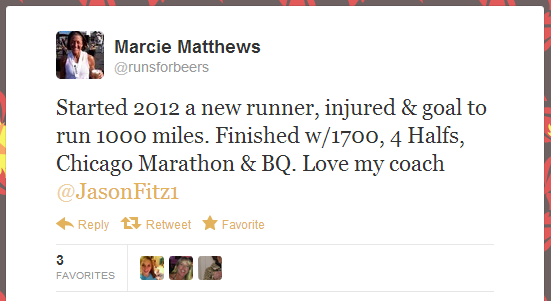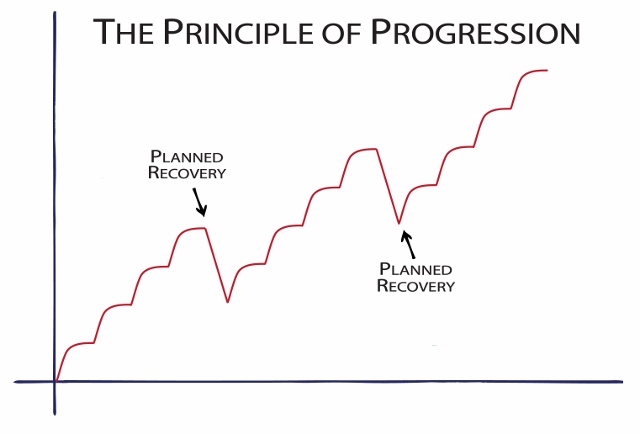Welcome to 2013! I want to make it your best year of running yet.

Every year, I announce a theme on Strength Running that influences articles here, gives you a new perspective on training, and (hopefully) makes you a better runner.
2011 was the Year of the PR.
2012 was the Year of Stretch Goals.
And over the last 12 months, I was repeatedly blown away by everything we’ve accomplished.
This small team of passionate runners is getting faster and dominating. Rob was lost in his running, doing the same thing over and over again. We worked together for a short month and he soon ran a 14 second personal best in the 5k without even trying.
Terry salvaged the scorching 2012 Boston Marathon and negative split every 5k in the race, running 3:24 in nearly 90 degree weather. And then there’s Andy, who finally broke his 5k PR and told me, “There is no doubt that my wife noticed my enhanced muscle tone.” Hilarious.
Chris went from a former couch potato to a dedicated RYBQ member training for his first half marathon this month. And Tim lost over 60 pounds!
These are the reasons why I coach – it’s a blast helping all of you become better runners!
Strength Running itself was no slouch in 2012. My favorite projects and highlights:
- Matt and I created Run Your BQ, the web’s best training community for marathoners
- My advice on racing was featured in Runner’s World and I was also featured on the Huffington Post, Health, and Fox
- My first book, 101 Simple Ways to be a Better Runner rocketed to Top 50 in the Sports Kindle section for over two weeks!
- I became a writer for Active and wrote their top ranked article for August
It’s time to toe the line again and set another record.
Introducing 2013: The Year of Consistency
Consistency. See also: uniformity, reliability, stability, evenness, dependability, steadiness.
Consistency is the fiber that connects workouts, weeks of training, and years of a running career. Without it, you’ll never improve and be doomed to repeat the same race performances.
It’s what makes your half marathon pace last year your easy run pace this year.
It can keep you healthy, build your motivation, and allow you to perform at a level you previously thought impossible.
Imagine what it would feel like if you could do this:

Or look at Jeremy’s story:
“My half got cancelled because of flooding but my buddies and I decided to run anyway. A river was literally running across the road in multiple spots and I ended up running about 14 miles with thousands of feet of elevation gain in the mud (we got pretty lost where some of the trail markers washed away too).It wasn’t anywhere near race pace but i was pretty happy.
I felt good at the end and actually did another 2 miles when we were done to get some nice views. I could have easily done 30 seconds a mile faster but it was a blast. I ran with joy in the shitty weather and it was very memorable and a lot of fun.
The training program worked great. I did as much as much as I was able to do. Thanks for your help, it definitely got me prepared and turned what would have been miserable into a great time.” – Jeremy S.
But those runners who lack consistency are directionless. Just look at these disheartening struggles:
“Trying to find balance with my training and day job is a constant struggle, always thinking ‘should I run, rest, or strength train today…'”
“I’ve tried some workouts and different exercises, but I was never sure if what I was doing was right or if it was helping.”
“Now that I can run 13 miles, how should my training differ for a half marathon? I want to do this right, but I’m trying to figure this out on my own and it’s hard.”
As a coach, hearing this makes me cringe. Many runners have a basic idea of how to train, but putting together all the moving pieces can be difficult so they do the easiest thing: nothing. It’s a classic case of paralysis by analysis.
Now look at runners who are able to train consistently; they’ve found the secret sauce. If there was ever a “secret” to running faster and reaching your potential, it’s consistency.
Why?
The Power of Consistency
Running is cumulative. What you do today influences what you’re able to do tomorrow. And what you do this week influences what you’re able to do next week, next month, and even next year.
You see, training is stacked. Distances, workouts, and paces always build on one another within a block of running. Even entire training cycles build, as you can see below:

Each cycle gets progressively more difficult, even after you take a planned recovery period. Over months and years, you’ll amaze yourself at what you can accomplish.
Here’s a quick example: a 10 mile run builds your endurance, running economy, and furthers a host of adaptations that help you become a better distance runner. You probably know this.
But just think: what if you could run a 10 miler every week? Or average 10 miles every day for a week – or a month – or 6 months?
That’s consistency.
It’s also the reason why you can’t go from sedentary to marathon in 12 weeks. No training plan can get you there safely or to the finish line comfortably. There’s a reason why you don’t see any “Couch to Marathon” programs.
And if you do, you know it’s just bad marathon advice.
How I Ran a 4:33 Mile (after 8 years)
Let’s look at my love affair with the mile.
When I started running as a freshman in high school, I was not talented, couldn’t make the Varsity squad, and wasn’t even a top Junior Varsity runner. In fact, my first run was only three miles and I didn’t even finish. For a week, it felt like I had been run over by a truck.
I considered the golf team, but stuck with cross country and after two months was able to improve my best in the mile from 6:30 to 5:55. At the end of the season I ran 5:45. Indoor track and about 9 races (with 3-4 seconds improvement every race) saw me become a 5:15 miler. I was officially addicted to the improvement that comes with running.
I experienced a similar progression during outdoor track and ended the season with a 5:03 mile PR.
But the faster you get, the harder it is to keep getting faster. So my improvement slowed and by the end of high school I ran 4:47. Two years later in college I ran 4:36. My personal best came about a year later, when I ran 4:33.
It took me over eight years to set this personal best and I worked hard at this particular distance for the majority of that time. Improvement is not something that comes easily and sometimes you don’t see it for a year or two. But then things click and you’ll drop significant time from all of your PR’s – if you’re consistent.
Eight years of structured, consistent team training led to my mile PR. Without consistency, I’d have run a lot slower and been left thinking, “I wonder what I could have run if only I stuck with it…”
It’s also how Matt took 100 minutes off his marathon, starting at 4:54 and eventually running 3:09 to qualify for Boston. It’s powerful stuff.
The Psychology of Consistency
Alright, so consistency is what separates achievers from under-performers. But how is it obtained? How do you string together consistent months and years of training?
It’s easier said than done. At its most basic, you need two elements:
- The physical ability to run consistently (i.e., injury-free training)
- The mental ability to run consistently (i.e., the motivation to train day after week after month)
Injury prevention is one of my favorite running topics and I’ve covered it extensively.
But in the next few months, I’m going to focus on the psychology of consistency. You’ll discover new ways to build habits and create instant motivation to complete your workouts (even the tough ones). When running is a routine, rather than a difficult task that you “try hard” to complete, consistency will be second nature.
A few weeks ago I sent an email to my newsletter readers describing how habits can be created using a three step process that’s illustrated in the book The Power of Habit by Charles Duhigg. While my email readers get more advice than I publish on the blog, here’s the essential lesson:
Surround your routine (running) with both a cue and a reward. The cue can be as simple as laying out all of your running gear by your bed. And after every successful run, you reward yourself by sharing your workout (like on dailymile) and receiving support.
It’s simple, but this powerful loop can dramatically help you become more consistent when you start craving the reward.
What Could You Accomplish with Consistency?
We’re all runners – but we all run for different reasons. Here are a few goals that you shared:
“I want to be successful, injury free and able to tell amazing stories of a stay-at-home mom and her victory of overcoming the everyday to become extraordinary.”
“I simply love running. Just crossing that finish line would mean so much.”
“When I crossed the finish line of my first 5K I almost cried with emotion. I never would have believed that *I* would be running a race. Now I want to take it to the next level and get faster and run my first half marathon!”
Reading this feedback gets me so excited to help you accomplish your 2013 goals!
And so, over the next several weeks, I’m going to unveil some new strategies I’ve never written about before. It’s time to make 2013 your best year yet , without the seemingly inevitable crash and burn of your New Year’s goals at the end of January…
Many of these strategies are included in the Strength Running Boot Camp – a 4-week coaching program to help make consistent running into a habit that sticks.
Tired of being injured? Need more motivation to get out of bed in the morning? Not sure what strength workouts to do? The SR Boot Camp might be right for you.
I also want to wish you a Happy New Year! Since 13 is my lucky number (it was my high school cross country number), I know this year is going to be a good one.
I can’t wait to share it with you.
– Jason.